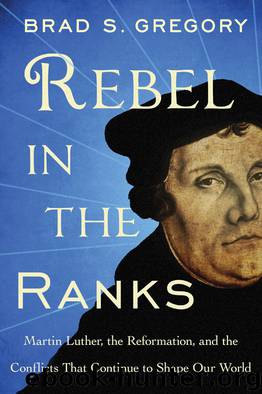Rebel in the Ranks: Martin Luther, the Reformation, and the Conflicts That Continue to Shape Our World by Brad S. Gregory

Author:Brad S. Gregory [Gregory, Brad S.]
Language: eng
Format: azw3
Publisher: HarperCollins
Published: 2017-09-12T04:00:00+00:00
Calvin, Geneva, and Reformed Protestantism
So great is John Calvin’s influence on Reformed Protestantism that it is sometimes simply called “Calvinism.” No reformer other than Luther makes such a major impact on the Protestant Reformation as a whole. With Calvin, the center of Reformed Protestantism shifts from German-speaking Zürich to French-speaking Geneva, which becomes the single most important Protestant city of the sixteenth century. Calvin’s Geneva takes in thousands of refugees and trains hundreds of ministers. The city becomes a leading center for Protestant printing and new Protestant institutions. Visitors who admire its rigorous religious ethos take this ethos with them when they leave, seeking to transplant it in far-flung countries such as Scotland, France, the Low Countries, and Poland-Lithuania. In so doing, they help to create conditions for religiopolitical conflicts across a continent.
Calvin was born in 1509 in the small town of Noyon, not far from Paris in northern France.11 In the 1520s he was a brilliant student in the French capital city, deeply influenced by humanism. Calvin’s father wanted him to become a lawyer, and unlike Luther, he dutifully obeyed. Studying law at Orléans and Bourges influenced his theology, including his legalistic use of texts as evidence and his precision in his arguments. He regarded scripture as a divine last will and testament notarized by the Holy Spirit, and he appreciated God’s law as a positive guide for public Christian life.
Sometime in late 1533 or early 1534, Calvin has a conversion experience. In late 1533 he leaves Paris, to which he had briefly returned, then flees the country altogether and becomes a religious refugee a year later, in late 1534. While Luther remains deeply rooted in Saxony, Calvin remains a refugee for the rest of his life, which also influences his theology, though his thoughts never stray far from concern for the land of his birth.
Not long after his conversion Calvin weds his humanistic learning, legal training, and knowledge of scripture into a synthetic statement of Reformed Protestant doctrine: The Institutes of the Christian Religion, published in early 1536 when Calvin is all of twenty-seven years old. Written in Latin, with a preface addressed to King Francis I of France, the Institutes embodies Calvin’s single-minded concern for true doctrine and pure worship. Immediately it establishes his reputation as a lucid, rhetorically powerful theologian and will become the single most influential treatise of Protestant theology in the Reformation era. Like Luther, Calvin is a superhumanly productive writer of treatises, biblical commentaries, and correspondence throughout his career, but the Institutes is his masterwork. He continues to revise and expand it, in both French and Latin, until the final Latin version in 1559, which is four times longer than the original.
Soon after the Institutes is published in 1536, Calvin heads for Strasbourg, but military unrest forces him to detour to Geneva. There he meets Guillaume Farel, the zealous French evangelical leader. Farel urges Calvin to ignore ivory-tower scholarship and concentrate instead on the practical demands of reform. Geneva, Farel convinces Calvin, needs him in the trenches.
Download
This site does not store any files on its server. We only index and link to content provided by other sites. Please contact the content providers to delete copyright contents if any and email us, we'll remove relevant links or contents immediately.
| Africa | Americas |
| Arctic & Antarctica | Asia |
| Australia & Oceania | Europe |
| Middle East | Russia |
| United States | World |
| Ancient Civilizations | Military |
| Historical Study & Educational Resources |
Room 212 by Kate Stewart(5105)
The Crown by Robert Lacey(4807)
Endurance: Shackleton's Incredible Voyage by Alfred Lansing(4769)
The Iron Duke by The Iron Duke(4349)
The Rape of Nanking by Iris Chang(4203)
Joan of Arc by Mary Gordon(4101)
Killing England by Bill O'Reilly(3996)
Say Nothing by Patrick Radden Keefe(3975)
I'll Give You the Sun by Jandy Nelson(3428)
Shadow of Night by Deborah Harkness(3360)
Hitler's Monsters by Eric Kurlander(3328)
Mary, Queen of Scots, and the Murder of Lord Darnley by Alison Weir(3202)
Blood and Sand by Alex Von Tunzelmann(3195)
Eleanor & Park by Rainbow Rowell(3153)
Darkest Hour by Anthony McCarten(3119)
Margaret Thatcher: The Autobiography by Thatcher Margaret(3080)
Book of Life by Deborah Harkness(2931)
Red Famine: Stalin's War on Ukraine by Anne Applebaum(2929)
The One Memory of Flora Banks by Emily Barr(2857)
